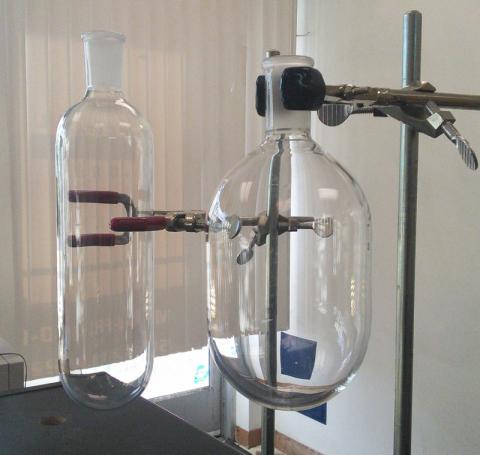These flasks offer some advantages over regular round-bottom flasks. Especially with heterogeneous reactions, the better mixing through greater turbulence upon stirring is of advantage. Due to improved stirring, their use in Ullmann reactions and Suzuki-type couplings on a larger scale may lead to considerable reduction in reaction time. The ring of deposit around the magnetic stirring bar oftentimes observed with heterogeneous reactions in round-bottom flasks may be avoided if comparing the same-scale reaction at the same stirring speed in the two flask types. The use of cylindrical flasks may substitute, therefore, sometimes for a mechanical stirrer. In regular reactions, foaming-up is better contained in a cylidrical than a spherical flask since the there remains a greater volume for foam than in the rapidly-diminishing headspace in a spherical flask. A further adavantage is realized when using heating block: A cylindrical flask cannot tip over when set into the well, while a spherical flask must be clamped. Spills and inconvenience when charging, assembling or sampling are therefore avoided. A further useful feature of cylindrical flask consists in their fit into commercial heting blocks. A heating block fit for a 250 Ccm. flask, for example, may now hold a 375 or 500 ml cylindrical flask, thus expanding the use of heating block with the consequent reduction in the inventory of differently-sized heating blocks.
The two flasks shown have a volume of 1 l each, Joint 24/40. Usable with air-condensers, and all regular attachments.Available in sizes of 50, 100, 250, 500 and 1000 ml and joints sizes 14/19 (50 ml), 19/22 (100 and 250 ml), 24/40 (250, 500 and 1000 ml).

